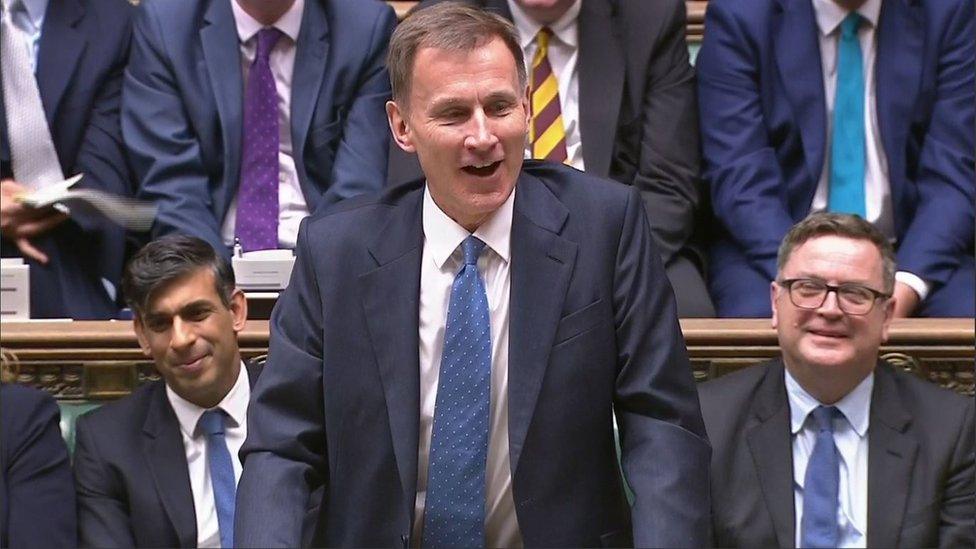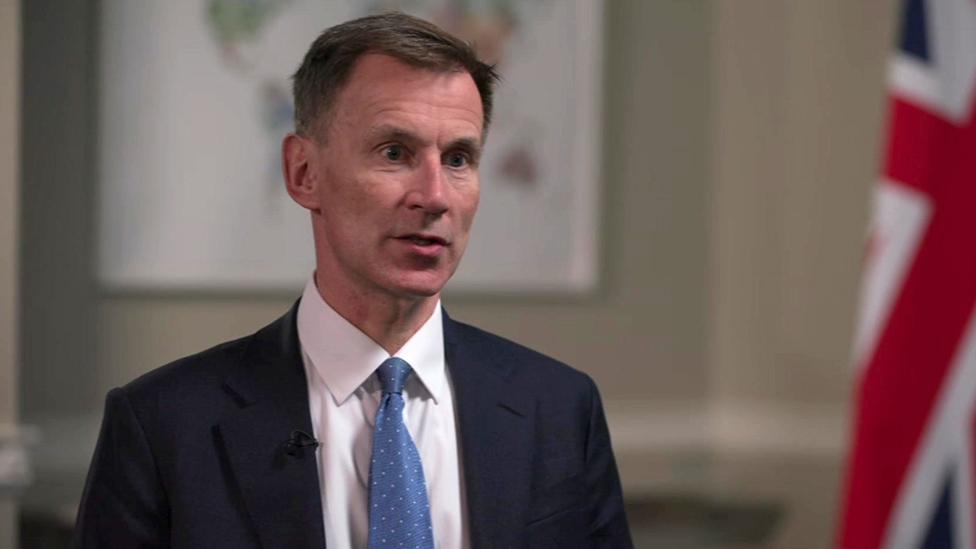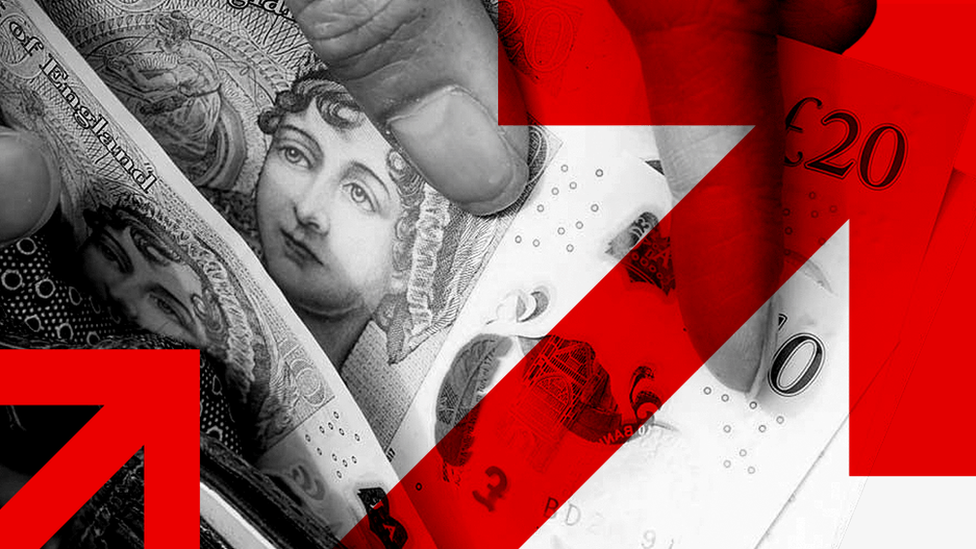Autumn Statement: Chancellor targets key election seats
- Published

Spending announcements targeting key general election seats in Wales have been announced by the Tory chancellor.
They include a new Investment Zone in north east Wales, where Jeremy Hunt will pay a visit on Thursday, as well as one in south east Wales.
There is also tax relief for freeports in Anglesey and Pembrokeshire - and £500,000 for the Hay Festival in the Brecon and Radnorshire constituency.
Mr Hunt's Autumn Statement includes a National Insurance cut from 6 January.
The main employee rate will fall by 2 percentage points from 12% to 10%.
The two Investment Zones, which will offer firms funding and tax incentives to help grow the economy, will be around Wrexham and Flintshire as well as Cardiff and Newport.
The chancellor said that as a result of his spending plans, Labour Welsh ministers in Cardiff will receive an extra £305m to spend on the public services they are responsible for, over the current financial year and for 2024-25.
But Welsh Health Minister Eluned Morgan said it was a budget written with an election in mind.
"They have given a lot of sweeties to people who are looking to keep Tory seats. I think that's disappointing," she said.
The National Living Wage is increasing by 9.8% for over-23s from April. with minimum pay rising by 12.4% for workers aged 21 and 22.
The chancellor told MPs he was extending tax reliefs for Freeports from five years to 10 years following "tenacious representations" including from Ynys Môn Conservative MP Virginia Crosbie.
There was also a boost for space research, manufacturing and testing facilities in Wales with a new "Space Clusters Infrastructure Fund" from the UK Space Agency.
Almost £8m will go to Cardiff-based Space Forge for a National Microgravity Research Centre, and £800,000 to Snowdonia LLP to develop the Space Technology Test Centre at the Snowdonia Space Centre in Llanbedr.
What do the politicians say?
Mr Hunt's cabinet colleague, Welsh Secretary David TC Davies, said it was "substantial direct UK government investment in Wales" and the UK government was putting "more money in the pockets of over a million working people across Wales, with cuts to National Insurance and another increase to the National Living Wage".
"The two new £160m Investment Zones in north-east and south-east Wales and an ambitious commitment to floating offshore wind will encourage business and create jobs, while £5m for transport links in Monmouthshire and £500,000 to support the Hay Festival are important investments in those communities," he said.
But Wales' Finance Minister Rebecca Evans told BBC Wales that she believes an extra £132m for the Welsh government for this financial year "relates to the health consequentials", meaning spending on England's NHS that prompts additional cash for the Welsh government.
"You'll recall the UK government agreed its health pay at the start of March this year and they still haven't been able to tell us how they will fund it, so we believe it relates to that," she said.
"We were in conversation with Treasury today and they still can't confirm that. So we understand that that's already baked into our plans. So that's not additional money for us to spend.
"Equally the additional funding for next year is specifically in relation to rates relief, so beyond that, there's no additional funding for public services."

Half a million pounds of support was announced for the Hay Festival
Plaid Cymru leader Rhun ap Iorwerth said that what the chancellor intended to be an "old-fashioned pre-election sweetener" will "leave a sour taste for many".
"What we've had today is more short-termism with no real resolution to the economic challenges we face - low investment and low productivity," he said.
"The chancellor made a song and dance about cutting National Insurance, but the reality is that cutting National Insurance by 2p will put £10bn back into the economy, but freezing of the thresholds is taking out £40bn.
"Let's remember that that tax increases under the Conservatives have already cost the average household more than £3,000."
Welsh Liberal Democrat leader Jane Dodds said Prime Minister Rishi Sunak "must be living on a different planet if he thinks this will ease the pain for hardworking families after years of cruel tax hikes from his government".
"The Tories have once again shown themselves to be completely out of touch and are once again failing Wales."
National Insurance
The UK government says 1.2 million workers in Wales will receive an average saving of £324 a year with the cuts to National Insurance (NI) in January.
The main NI rate falls from 12% to 10% and Class 2 NI - paid by self-employed people earning more than £12,570 - will be scrapped.
Class 4 National Insurance for self employed - paid on profits between £12,570 and £50,270 - will be cut from 9% to 8% from April.
Welfare benefits
Benefits will increase next year by 6.7%, the inflation rate for September.
This applies to working-age benefits, such as means-tested benefits such as universal credit, and disability benefits.
It is an important announcement for the more than 250,000 households in Wales on universal credit, according to figures from the Department for Work and Pensions.
There were suggestions the chancellor would instead use the lower 4.6%. inflation figure for October.
There will also be a rise for people receiving housing benefit or the housing element of universal credit for privately rented properties, around 180,000 households in Wales.
The sum they receive is decided by a formula called the Local Housing Allowance, external (LHA), which has been frozen since 2020 despite rents rising sharply.
Mr Hunt said he will increase LHA by the 30th percentile of local market rents, giving households an average of £800 of support next year.
Pensions
Mr Hunt confirmed what's called the "triple-lock" for state pension rises will apply next year as usual, raising the state pension by 8.5%, which is in line with average earnings.
The increase is worth up to £900 more a year, which he called "one of the largest ever cash increases to the state pension".
Minimum wage
The minimum wage, which employers are mandated to pay by law and is officially called the National Living Wage, will increase by more than a pound next April to £11.44 per hour.
It is currently £10.42 an hour for workers aged over 23.
The new rate will also apply to 21 and 22-year-olds for the first time. The UK Treasury says 130,000 workers in Wales will benefit from the increase.
Minimum pay for 18-20 year olds will increase by £1.11 hourly to £8.60 per hour, with a further 10,000 workers expected to receive that rise.
Businesses
A tax break for firms, called "full expensing", meaning they can deduct spending on new machinery and equipment from profits, will become permanent.
Mr Hunt called it the "largest business tax cut in modern British history", to investment and economic growth.
Households living close to new pylons and transmission infrastructure to get up to £1,000 a year off energy bills for a decade, in an effort to overcome local opposition as Britain moves towards an electricity grid more geared to to renewable energy generation.

Analysis, by BBC Wales Westminster Correspondent Shelley Phelps
The marginal seat bingo in the Chancellor's speech clearly delighted Welsh Tory MPs.
One even texted me to check I'd clocked Jeremy Hunt mention their constituency.
You can bet they'll be keen to mention those local investment announcements on social media and in leaflets.
But with the Conservatives trailing in the polls, will it be enough to turn their fortunes?
We're also awaiting more details on some of what was mentioned.
How will the new Investment Zones work, for example? And when will they get up and running?
There are questions too for the Labour-run Welsh government.
The chancellor has extended business rate relief for England. Will Wales' Finance Minister Rebecca Evans replicate the move? The Federation for Small Businesses in Wales is calling for her to do so.
Today's announcement is unlikely to reduce tension and rows over budgets between Westminster and Cardiff Bay.
In fact, it's something we're likely to hear more of as the Welsh government puts together its draft budget, due for publication next month.

CROSSBOW KILLER: Investigating the case of a Welsh murder stranger than fiction
ACID DREAM: How a Welsh farmhouse sparked a revolution of the mind

Related topics
- Published22 November 2023

- Published22 November 2023

- Published22 November 2023
